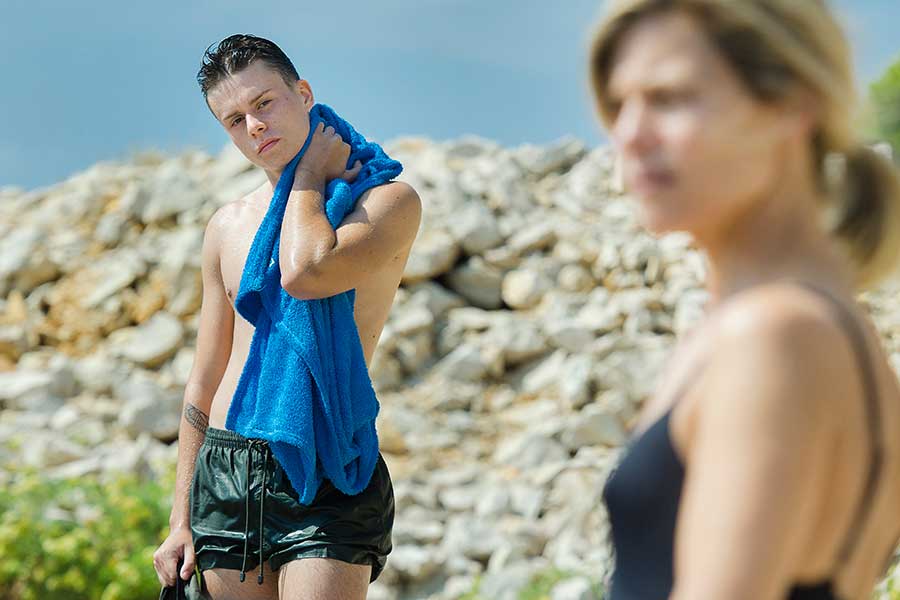The fantastic French drama “The Workshop,” opening April 6 at the Ritz at the Bourse, is cowritten by out gay writer Robin Campillo, a longtime collaborator of director/cowriter Laurent Cantet. Their film depicts the intense relationship that develops between mystery writer Olivia Déjazet (Marina Foïs) and Antoine (Matthieu Lucci), a student in her summer workshop. Antoine’s radical ideas — as well as his candid remarks and actions — cause friction in and outside the workshop. But this mysterious young man is also quite alluring to Olivia.
Campillo, who made the staggering ACT-UP drama “BPM” last year, chatted via WhatsApp with the Philadelphia Gay News about his new film.
PGN: “The Workshop” is about teenagers and writing. What were you like as a student?
RC: In 1983, I was 21 and went to the Institut de hautes éstudes cinématographiques (IDHEC). This cinema school saved me. It was like a refuge. I was so afraid of what was going on [with AIDS]. It was at that time I decided not to have sex anymore. I met Laurent because we were in the same group in the IDHEC. We connected with each other. We are still working together 35 years later.
PGN: This is your fifth film together. Can you describe how you collaborate with Laurent on the scripts and/or scenarios?
RC: I don’t know what the difference is between a gay and straight man, but we are like brothers in a sentimental relationship. We’ve been through arguments and there is a lot of electricity between us. He works with me, because I try to go further, and push him a little bit. Sometimes he won’t cross the line, but I think it’s because we are so different. I’m more baroque than he is. I think he’s more grounded than I am. It’s an interesting relationship. We’re a little co-dependent.
PGN: “The Workshop” is not a queer film, nor are any of the films you’ve cowritten with Laurent. Can you talk about making queer films as a director but “straight” movies as a cowriter?
RC: My first film, “They Came Back,” was not a gay film, but I think all my films are queer in a general way. I once tried to propose a project for Laurent that was a bit close to my film “Eastern Boys.” Laurent told me that he was not able to do this film because he didn’t know how to manage the characters, and that I should do the film myself. Our film “Foxfire” (2012) is the most gender-bending film — there is a kiss between two girls.
PGN: What decisions did you make about Antoine’s character?
RC: Antoine is right wing, but you feel he could be a lot of different things. I like that the character is not totally fixed. He’s drifting. A lot of young people in France are like this — they have radical thoughts but don’t know what to do. They are also trying to protect themselves from all the patronizing thoughts and people trying to lecture them on what they should be. We wanted to [present] someone who could be seduced by radicalism but doesn’t know who he is.
There’s also a homoeroticism in that this young straight guy has this self-discipline where he tries to be fit and take care of himself — which was what gay men were doing 25 years ago. We wanted to show him taking care of his body because he doesn’t have the money to be in the gym. It’s connected to gay [culture] but in reality, it’s a way to survive a boring life.
PGN: What observation do you have about the casting of newcomer Matthieu Lucci, who makes his screen debut here? He’s very appealing.
RC: Laurent is very straight, but he’s very good at finding sexy guys for his films. I think there has always been a homoeroticism in his films. He is very good at taking the time in casting the right guy. Matthieu is this kind of grounded character, very handsome and weird. You are attracted to him as a spectator.
PGN: The film has some interesting tension in that you don’t know what might happen at any moment. Can you talk about the suspense in “The Workshop”?
RC: The edgy thing we try to introduce is that Antoine is a sexy right-wing guy. Olivia is almost jealous of him; he represents something, and it is threatening and attractive to her — which is a big part of the suspense. He puts her in a kind of danger. It’s like my film “Eastern Boys”; you open your door to someone attractive, but there is danger. We wanted the spectator to have the feeling that they are discovering things themselves. We tried to make the audience unprepared for what they will see. n
